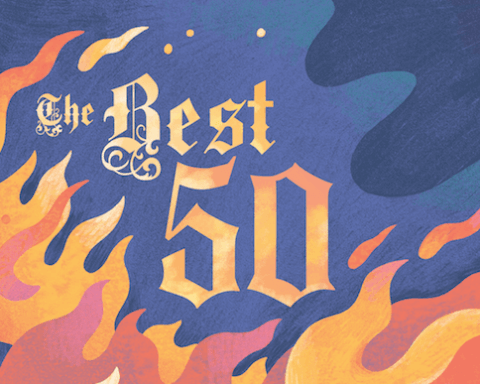Mountain Equipment Co-op (MEC) has a long history of sustainability as a retail cooperative focused on getting people outside.
Since it was founded in 1971 by a group of west coast mountaineers looking for a place to buy reliable and affordable gear, MEC has vowed to do business differently by building a co-op with democratic principles, as an alternative to private ownership. The company says its grassroots foundation still exists, which is to “make things happen, deal fairly, find strength in community, and inspire adventure.”
Nearly 50 years later, the Vancouver-based company has grown to 22 stores across Canada and strengthened its sustainability efforts through responsible product sourcing, a commitment to shrink its environmental footprint and the championing of social causes.
MEC was the first Canadian retailer to publicly disclose its list of factories and their locations, is a longstanding Bluesign member (ensuring the use of sustainable ingredients and production in the textile industry), and traces its down and wool to ensure that animal welfare standards are being met. The company has also recognized and worked to correct some of its own flaws over the years, including low representation of people of colour in promotional materials.
MEC’s past environmental, social and governance (ESG) performance landed the co-op in the top spot on the Corporate Knights 2020 Best 50 Corporate Citizens in Canada ranking, based on data from the company’s public disclosures for the period from Feb. 26, 2018, to Feb. 24, 2019, which is its 2018/19 fiscal year. (The data doesn’t reflect impacts from COVID-19.) MEC’s overall score of 85.2% was a significant increase from its 2019 ranking, when it placed 17th, with an overall score of 66%.
“MEC has a very compelling, powerful social purpose,” says Coro Strandberg, a sustainability strategist and president of Vancouver’s Strandberg Consulting. “It doesn’t surprise me that a social-purpose company would become a global sustainability leader.”
MEC’s top marks in the ranking come largely in three areas: clean revenue, CEO-to-average-worker pay ratio and gender diversity on its board and executive leadership team. The company’s clean revenue score – a measure of revenue from all goods and services that have clear environmental and, in some cases, social benefits – was 100%. MEC had the highest clean revenue percentage in this year’s ranking in comparison to its retail industry peers.
For the 2018/19 fiscal year, the MEC Label produced 80 fair-trade-certified products, and more than 1,100 products were made with environmentally preferred materials (including organically grown or recycled content, responsibly sourced down and Bluesign-approved textiles). In fact, 88% of MEC Label clothes and sleeping bags were Bluesign approved, and the company is striving to hit 100%.
MEC also scored well for its ratio of CEO-to-average-worker pay, which, according to its disclosures for the 2018/19 fiscal year, was 15:1. (The smaller the ratio, the smaller the gap between CEO and employee earnings; by comparison, Zara’s parent company, Inditex, has a ratio of 357:1.) MEC says the calculation is based on regular wages, overtime, vacation pay and bonuses for all MEC employees, both hourly and salaried staff, in the 2018 pay calendar year.
It also increased its ranking based on the number of women in executive roles. MEC maintains a 50% ratio of women on its executive management team, which is the highest score in its industry in Canada, according to data sourced by Corporate Knights, and the fifth highest in the world within its industry.
In 2018, former MEC CEO David Labistour acknowledged in an open letter that the company was underrepresenting people of colour in its marketing and advertising and vowed to do better.
CEO Phil Arrata, who took the top job in July 2019 after serving on MEC’s board from 2015 to 2018, wasn’t available for an interview for this article. In an email through a company spokesperson, Arrata said MEC “is dedicated to being inclusive” among its more than 2,700 employees and its customers. “We want to make sure that everyone feels welcome at our stores, distribution centres and home office,” Arrata stated. “I am very proud of the many MEC staffers who have been integral to the development of the initiatives we have in place right now.”
Arrata also renewed the Outdoor Industry CEO Diversity Pledge, to hire and support a diverse workforce and leadership team, among other promises. In January, MEC made changes to its workforce, saying it would convert about 950 casual, non-permanent roles into full- or part-time jobs with benefits to reduce staff turnover and improve customer service.
The changes are part of a restructuring to restore the co-op’s financial health. “While MEC is not profit-driven in the same way as the retailers we compete against, we still must be profitable to ensure we deliver great service to our members, elevate employee experiences and continue to contribute to the communities where we live, work and play,” Arrata wrote in an open letter in January.
The company’s challenge going forward will be to sustain its ESG performance amid an extremely difficult financial situation. MEC said it lost $11.5 million for the year ended Feb. 24, 2019, on sales of $462.4 million. The results included $8.5 million in restructuring and reorganization costs. The previous year, it saw a profit of $11.7 million on sales of $454.8 million. In April, the company said the economic impact of COVID-19, which forced the retailer to temporarily close its brick-and-mortar locations, “is severe” and sales “have experienced a drastic decline.”
How MEC emerges from the coronavirus shutdowns, including its ESG actions and commitments, will determine its future growth.
Brenda Bouw is a freelance writer and editor, as well as an author and ghostwriter based in Vancouver.







